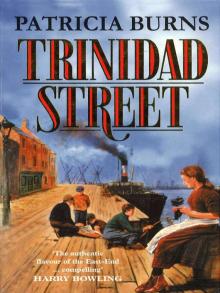- Home
- Patricia Burns
Packards
Packards Read online
Contents
About the Book
Also by Patricia Burns
Title Page
Dedication
Chapter 1
Chapter 2
Chapter 3
Chapter 4
Chapter 5
Chapter 6
Chapter 7
Chapter 8
Chapter 9
Chapter 10
Chapter 11
Chapter 12
Chapter 13
Chapter 14
Chapter 15
Chapter 16
Chapter 17
Chapter 18
Chapter 19
Chapter 20
Chapter 21
Chapter 22
Chapter 23
Chapter 24
Chapter 25
Chapter 26
Chapter 27
Chapter 28
Chapter 29
Chapter 30
Chapter 31
Chapter 32
Chapter 33
Chapter 34
Chapter 35
Chapter 36
Chapter 37
Chapter 38
Chapter 39
Chapter 40
Chapter 41
Chapter 42
Copyright
About the Book
Packards is an Oxford Street department store founded in the mid-nineteenth century by Sir Thomas Packard. In 1908 he is old and seeks his successor. His only daughter and her feckless husband spend his fortune but despise its provenance, so he looks to his grandchildren: EDWARD has all his grandfather’s ruthlessness but none of his vision; PERRY is a good-time boy; and AMELIE, intelligent and ambitious, is willing to take on anyone to gain control of the store. Alongside their story is that of Packards employees: DAISY CHAPMAN, thrilled to have found an escape from East End drudgery, who is skilled and promotable but forced to choose between love and her job; ISOBEL NORTON, who has fled from her brother-in-law’s advances to make a new life for herself; and JOHNNY MILLER, loved by Isobel and in love with Daisy. Together, their stories combine to create a sweeping, absorbing vision of a cross-section of society in the early years of the twentieth century.
Also by Patricia Burns
Trinidad Street
Cinnamon Alley
Keep Safe for Me
Packards
Patricia Burns
To Marianne, Nicholas and Daniel
who keep my feet on the ground
1
‘HOME AT LAST!’ Amelie said.
She stood at the top of the steps at the entrance to Victoria Station and breathed in the familiar London smell of smoke, horses, petrol fumes and human beings.
‘Aren’t you going to find it a trifle dull after America?’ her brother Perry asked.
‘Chicago was wonderful, but this is home,’ Amelie said.
Around her, people flowed in and out of the station, new motor cabs and outmoded hansoms put down and picked up passengers, porters toted mountains of luggage and cleaners swept the steps, while newspaper boys, flower girls and hot chestnut men cried their wares. Amelie took it all in, absorbing the sights and sounds she had been away from for the last three months, trying to pinpoint just what it was that entranced her. Then it came to her.
‘London voices,’ she said. ‘Do you know, I’d forgotten how nice it is to hear them.’
‘Even cockney?’ Perry asked, amused.
‘Especially cockney. Americans might speak the same language as us – almost – but it sounds different. This is where I belong. Be a darling, Perry, and go and get me some violets from that girl.’
‘Violets! Oh really, Mel, how common,’ Perry grumbled, but he did as he was asked, and was rewarded with a flirtatious smile from the flower girl.
Nobody looking at them could have failed to recognise that the Amberleys were brother and sister. Both had very fair skins with a tendency to freckle, blue eyes, and thick fair hair with a reddish tinge that framed handsome regular faces with straight noses and mobile mouths. They were of a height, making Amelie tall for a girl, but while Perry, at twenty-one, was already gaining weight, Amelie was unfashionably slim, a result of boundless energy and a love of sport. Both were dressed in the height of fashion, Perry in a long overcoat with an astrakhan collar, his glossy top hat set at a jaunty angle, and Amelie in a loose travelling coat over a tailor-made skirt and jacket, with a velvet hat trimmed with feathers. They looked like children of the nobility, but in fact they were not of the old order, but of London’s new and successful shopocracy.
A Rolls-Royce Silver Ghost glided to a halt at the foot of the steps, stately amongst the vulgar scurrying of the cabs. Amelie gave a cry of delight.
‘Grandfather’s sent his motor! Oh the darling!’
She ran down the steps as fast as her restricting layers of clothes would allow, greeted the chauffeur, who stood smartly to attention as he held the door open for her, climbed inside and sat back on the maroon leather upholstery with a sigh of pleasure. She might have known that her grandfather would not have forgotten that she was arriving home today. After the excitement of coming into port at Southampton, she had been rather hurt to find that only Perry had come to meet her, especially as she guessed he had been given the task because he had nothing better to do with his time.
‘He remembered me, then,’ she said to Perry as he sat down beside her.
‘Remembered! It’s all he’s talked about this past week. He’s missed you, Mel.’
‘I’ve missed him,’ Amelie said, tears unexpectedly pricking her eyes. When the chauffeur finished supervising the loading of her luggage she picked up the speaking tube to talk to him.
‘Would you drive back via Oxford Street, please, Brightman? I want to take a little peek at the store.’
Perry protested, but Amelie overruled him.
‘I must just see that it’s still there.’
The Rolls pulled out into Buckingham Palace Road to join the slow-moving stream of drays, delivery vans, carts, cabs and omnibuses. Amelie leant forward, gazing out of the window and commenting on everything they passed.
‘Isn’t it odd how you expect everything to be different when you come back from a holiday? I’ve been away three months and so much has happened, and yet everything’s very much the same.’
‘They’re hardly likely to pull it all down and build it up again while your back’s turned,’ Perry said.
‘They do in Chicago. They’re building all the time there, higher and higher.’
‘Sounds most frightfully vulgar.’
‘Rubbish, it’s exciting.’
The motor swept round the palace and accelerated into the Mall. Here the commercial traffic gave way to the shining motor cars and horse-drawn carriages of the rich.
‘How beautiful it is – look, snowdrops under the trees in St James’s Park. Spring’s on the way already here. There’s still five feet of snow on the ground in Chicago.’
‘Still dashed cold, though,’ Perry complained.
‘Cold! This is nothing. This is warm. You should feel the wind when it comes down off Lake Michigan. It shrivels the skin off your face.’
‘You know, old thing, if you keep on with all these traveller’s tales, you’re going to become the most dreadful bore,’ her brother told her.
‘You’re the bore if you can’t be interested in anything other than yourself,’ Amelie retorted.
They bickered amicably the length of St James’s and Bond Street, but when they reached Oxford Street Amelie was distracted. Amongst all the array of shops from small specialist establishments to big stores, there was just one that she wanted to see.
‘There it is!’
‘Just where you left it,’ said Perry.
Amelie ignored him.
For there it indeed was – Packards, Suppliers to the Nation. A solid edifice of Portland stone with eighteen display windows, five entrances, four selling floors and ninety-eight departments. A glow of possessive pride started within her and spread over her whole body. Nothing in London, from the Crown Jewels to the Zoological Gardens could compare to the splendour of Packards.
‘The greatest store in the whole world!’ Amelie declared.
‘What, better than the ones in Chicago?’ Perry teased.
‘Infinitely,’ Amelie maintained.
The stores on State Street might be building up to eleven storeys and have air conditioning and escalators, but Packards had something that they did not. Her family name. Or rather, her grandfather’s family name. There were times when she almost forgot she was an Amberley. She had always been far more of a Packard.
The chauffeur took the motor car right round the island site, giving Amelie time to peer at the windows and assess the flow of customers into the store. She gazed enviously at the people going through the doors.
‘Oh I wish I could just have a little look round,’ she said.
‘Best not, old girl. Mama will be waiting for us, you know.’
‘I know, but – oh, look at those hats!’ Amelie grabbed the speaking tube and told the chauffeur to stop. Ignoring Perry’s protests yet again, she scrambled out to look more closely at the display of hats mounted on narrow columns of varying heights. The window was a feast for the eyes, a winter garden of velvet and silk creations adorned with feathers or bows or rosettes or artificial flowers with the occasional practical tweed cap for contrast. But looking at the window was not enough. Amelie yearned to go inside.
Unable to leave his sister unescorted in a public street, Perry joined her on the pavement.
‘Come on, old thing.’
‘Don’t you think I should just call on Grandfather and let him know I’m back? Especially as he sent the motor for me.’
‘Mama’s expecting us. We’re already late, and you know what she’s like about punctuality.’
The euphoria of homecoming deflated just a little. Amelie knew all too well what her mother was like about punctuality.
‘Yes, yes,’ she agreed, reluctantly turning away.
‘Anyway, it’s only the store. It will still be here tomorrow,’ Perry pointed out.
‘Only the store –!’ Amelie began. But she did not bother to finish. Perry did not understand. Neither would he understand her ambitions. They would have to wait until she managed to see her grandfather.
They both stepped back into the motor and the chauffeur headed south into Mayfair. Dusk was falling and lights were coming on in a few of the white stuccoed houses in the elegant eighteenth-century terraces and squares. Many of them were unoccupied at present, as their aristocratic owners were away on their country estates. Mayfair would not come properly alive until the Season got under way in late spring. Amelie tried not to think of the Season.
The motor pulled up in front of the Amberley’s house in Bruton Street. It was a four-storey building in a terrace of identical houses, each with a semi-basement, a pillared porch, and three pairs of well-proportioned windows decreasing in height with each floor. Home. The home that her grandfather paid for and her mother considered not large enough.
Amelie jumped out of the car and ran up the steps, her hand out to grasp the knocker, but before she could reach it the door opened to reveal the butler.
‘Welcome home, Miss Amelie. I trust you had an enjoyable trip?’
She greeted him with real pleasure. ‘Very enjoyable, thank you, Nichols. You’re well, I hope?’
‘In excellent health, I thank you, Miss Amelie.’
The footman took her travel coat and hat, and Nichols opened the door into the drawing room.
‘Miss Amelie, madam.’
Warmth enveloped her. As always, the room was unusually well heated for a London house. Across a blue and fawn room set with elegant walnut furniture, Winifred Amberley sat on a chintz-covered sofa. She did not smile to see her only daughter.
‘So here you are at last. You’re late. I was expecting you half an hour ago.’
Amelie felt a spurt of irritation. How typical. She had been away for three months, then travelled from Chicago by train, steamer and train again, and the first thing her mother did was to accuse her of being half an hour late.
‘Yes, here I am, Mama, turned up again like the bad penny,’ she said.
Winifred was dressed in an oyster-coloured silk tea gown trimmed with layers of ruffles and lace, which went some way to disguising the fact that now she was over forty she was putting on a considerable amount of weight. Her once pretty face had a decided double chin and her fair hair was fading to grey, but her eyes were still as blue as Amelie’s.
‘Well, come here, child.’
She extended a chubby hand and offered her cheek to be kissed. Amelie walked over and bent to give her a light peck. Her mother’s skin felt soft and downy, like an overripe peach.
‘Hello, Mama. How are you? You’re looking well.’
‘Tolerably well, thank you.’
Winifred’s eyes raked over her daughter. Despite the fact that she was now eighteen, had left school and been all the way to the United States and back, Amelie found herself holding her breath as she used to as a child when Nanny brought the three of them – herself, Perry and their older brother Edward – down at six o’clock each evening to meet their parents. Her father, if he was there, was always delighted to see them, asking after what they had been doing and ready to initiate guessing games or hide and seek. But their mother was quite different. First would come the inspection, when both the children and Nanny would tremble least a ribbon should be unevenly tied or a sock not quite pulled up. Then there would be the inquisition. Had they been for their walk? Eaten up all their meals? Learnt their lessons? Finally some sort of performance was expected, the repeating of a list of facts or a times table, or the recitation of a poem, or the playing of a piano piece. Amelie and Edward competed to shine at these tests. Both had quick brains and the will to apply them. They achieved faultless feats of memory and precision. But somehow, it was never quite good enough. Their father would clap and cry ‘Bravo!’ but their mother would merely nod. Perversely, it was Perry who gained her smiles. Perry found learning a trial, so did not bother himself too much with it. He muddled his way through and fell back on charm, and to Edward and Amelie’s disgust, it usually worked. With a laugh and a joke and a self-deprecatory smile, Perry could win through to the well-hidden softer side of Winifred’s nature.
Now, Amelie waited for her mother’s comment. She hoped allowances would be made for the fact that she had not been able to change since leaving the liner at midday.
Winifred gave a nod. There was grudging approval in her face. Amelie let out her breath. Evidently her fawn and brown travelling outfit with its military-style frogging and braid had passed muster.
‘I had hoped you might have gained a little more distinction to your figure while you were away, but even so, you do seem to look rather less gawky than you did. Yes, a definite improvement. Come and sit down. I think there might be time for some tea before the dressing bell.’
Winifred’s days were divided not by meals, but by the need to wear the correct clothing at any given time. She could change anything up to five times between getting up and going to bed, and would no more think of wearing a morning gown after twelve noon than she would consider carrying a parcel or preparing a meal. Her personal maid was kept fully employed seven days a week making sure she always presented an immaculate appearance to the world. So naturally the rigours of dressing for dinner must take precedence over greeting a daughter who had been away for three months.
‘And what manner of establishment do the Schneiders keep?’ she enquired. ‘I failed to form more than a very vague impression from the brief letters you sent me.’
‘I wrote every week, Mama,’ Amelie protested. ‘And I thought I told y
ou a great deal about them. They are very kind and generous people.’
She launched into a long description of the people she had been staying with, the family of one of her schoolfriends, meat packers of a wealth and influence that her mother would have envied, if only it had come from a respectable source. But though Winifred was mildly impressed by the tales of dazzling social events given by the Schneiders and actually surprised to find that they funded a host of cultural activities in Chicago, nothing could shift the faintly patronising expression in her face and voice. Amelie knew exactly why. In her mother’s eyes, the Schneiders were really nothing more than glorified butchers. It gave her a very satisfying feeling of superiority. Winifred lived with the mortifying knowledge that polite society, the only people who mattered, would always look on her as the daughter of a shopkeeper. A very successful shopkeeper, but none the less, tainted by the smell of Trade. Winifred had managed to marry into Society by capturing Bertie Amberley, youngest son of an impoverished baron. The two of them and their three children had lived on Packards’ money ever since. But Winifred despised Packards and all it stood for. She wanted only to be accepted into her husband’s world.
‘I’m sure it’s been a very pleasant holiday for you,’ she said at last, breaking into Amelie’s account of the ball the Schneiders had held the week before she left. ‘But after all, they are not really the sort of people one wants to cultivate. Tomorrow you shall come with me when I am paying calls, and start leaving your card. To be sure, society is very thin at the moment, but there are a few families in Town for one reason or another.’
Amelie knew better than to disagree outright at this early stage, but she knew just what she was going to do tomorrow. She was going to visit her grandfather at the store.
2
AT HALF-PAST ten the next morning, Amelie won the first round in what she knew was going to be a battle royal with her mother. Fortunately, she had courtesy and family ties on her side.
‘Grandfather would be so disappointed if I didn’t call on him today,’ she said. ‘And I could go this morning. You won’t be visiting your friends till this afternoon, will you?’

 Packards
Packards Bye Bye Love
Bye Bye Love Follow Your Dream
Follow Your Dream Trinidad Street
Trinidad Street We'll Meet Again
We'll Meet Again